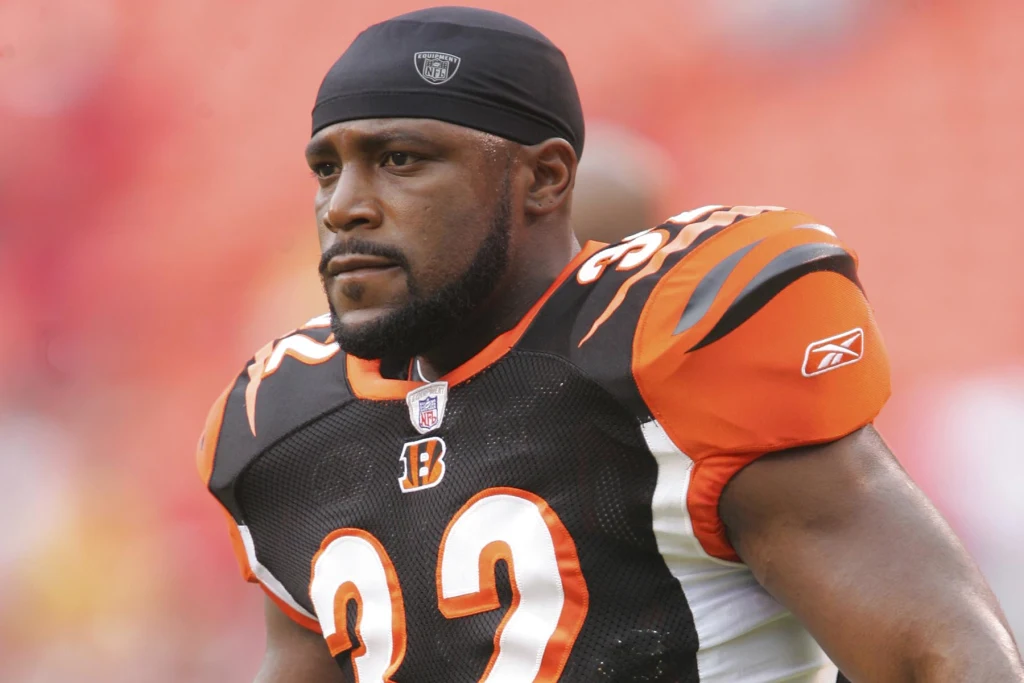Did Rudi Johnson commit suicide? Inside details of his shocking death

Cincinnati Bengals running back Rudi Johnson in 2006. Image Credit: Paul Jasienski/AP file
Former Pro Bowl running back Rudi Johnson, one of the Cincinnati Bengals’ most dependable players in the early 2000s, has died at the age of 45. Florida authorities confirmed Tuesday that his death is being investigated as an apparent suicide.
According to the Miami-Dade Sheriff’s Office, there is “no foul play suspected,” with Detective Joseph Peguero telling NBC News that “all indications are leading to suicide.” Emergency responders with Miami-Dade Fire Rescue were called to Johnson’s Sunny Isles Beach home just after 11 a.m. Monday, where they treated and transported an “adult trauma alert patient.” Public records show the address matched Johnson’s residence.
Call for Action on CTE
The sudden death of the former NFL star has reignited conversations about chronic traumatic encephalopathy (CTE), a degenerative brain condition linked to repeated head trauma in contact sports.
Johnson’s longtime agent, Peter Schaffer, urged the league and medical community to step up efforts in research and support for players.
“These tragic circumstances must also serve as a call to action,” Schaffer said in a statement. “The NFL and the scientific community must do more — more research into CTE, more innovation into how we can treat it, prevent it, and provide support to those living with it. Players past, present, and future deserve nothing less.”
We are deeply saddened by the passing of Rudi Johnson. pic.twitter.com/wXTd8jgEBl
— Cincinnati Bengals (@Bengals) September 23, 2025
While the official cause of death has not been publicly announced, Johnson’s passing has intensified scrutiny over how brain injuries may impact former players long after their careers end.
A Bengals Great
Drafted out of Auburn in the fourth round of the 2001 NFL Draft, Johnson became a cornerstone of the Bengals’ offense after the departure of Corey Dillon. Between 2003 and 2006, he produced three consecutive 1,000-yard seasons — including back-to-back campaigns with more than 1,450 rushing yards.
Johnson earned a Pro Bowl selection in 2004 and remains one of Cincinnati’s most decorated rushers, ranking third in franchise history with 48 rushing touchdowns. He was instrumental in the Bengals’ 2005 AFC North title run, though injuries later slowed his career.
Team president Mike Brown said in a statement that Johnson was admired both on and off the field.
“Rudi was a fine person and an excellent running back for us,” Brown said. “He was dependable and productive as a player, and very popular among his teammates. Everyone liked him and saw him as a dear friend. We are deeply saddened by his passing.”
Remembering His Legacy
Johnson retired from football after a final season with the Detroit Lions in 2008. His agent remembered him not only as an athlete, but as a man who gave generously to those around him.
“Rudi lived his life in the service of others,” Schaffer said. “His legacy will not be measured by statistics or accolades, but by the countless lives he touched and the love he gave so freely.”
Johnson’s death adds to a growing list of former NFL players whose struggles with mental health and possible CTE-related issues have drawn attention to the long-term risks of the sport.
Remembering Rudi 🧡
📰: https://t.co/YOlqzbQNnu pic.twitter.com/XjQy4Tqhfk
— Cincinnati Bengals (@Bengals) September 23, 2025
FAQ
Q1: How did Rudi Johnson die?
Rudi Johnson, 45, died in Florida in what authorities described as an apparent suicide. NBC News reported that detectives found no foul play was suspected.
Q2: Did CTE play a role in Rudi Johnson’s death?
While CTE has not been officially confirmed as a cause, Johnson’s agent Peter Schaffer raised concerns that brain injuries sustained during his NFL career may have contributed to his struggles, urging more research and action.
Q3: What is CTE and why is it linked to NFL players?
Chronic Traumatic Encephalopathy (CTE) is a degenerative brain disease associated with repeated head trauma. Many former football players have been diagnosed with CTE posthumously, fueling debates about safety in the NFL.
Q4: What were Rudi Johnson’s NFL achievements?
Johnson played most of his career with the Cincinnati Bengals, earning a Pro Bowl selection in 2004. He recorded three consecutive 1,000-yard rushing seasons and ranks third in franchise history with 48 rushing touchdowns.
Q5: How has the NFL responded to CTE concerns?
The NFL has invested in concussion research and safety protocols, but critics argue more needs to be done. Johnson’s death has renewed calls for stronger protections and long-term support for retired players.

